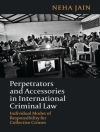This book is a tribute to the work of Professor Terry Gill, offered to him by friends and colleagues who are also academics and/or practitioners in the field of International Law of Military Operations (ILMO).
ILMO is a distinct sub-discipline within public international law and domestic public law, covering all domains of military operations: land, sea, air and (cyber)space. As such, ILMO includes elements of other branches of public international law, such as international humanitarian law, human rights law, the law on the use of force, the law of the sea, the law of State responsibility, arms control law and the law of international organisations. Importantly, as a hybrid field of law, ILMO covers the legal basis for military deployment both nationally and internationally, as well as the subsequent international legal regimes applicable to the forces (once deployed) and the domestic administrative and constitutional issues related to the relevant forces.
Control is a central notion of ILMO and is the leading theme of this book. The contributions in this book reflect the variety of legal frameworks applicable to military operations and offer an insightful view into the various legal and factual roles of control. The legal notion of control is considered, inter alia, in relation to restraints in the decision to deploy military forces and the legal basis for doing so. The impact of control is also discussed in relation to State and command responsibility and in different situations, including during peace operations, occupation and other situations of armed conflict. Additionally, control is considered over the armed forces themselves, over detainees migrants at sea and over the type or scale of force used in military operations, through targeting rules or rules of engagement. Furthermore, the book contains several discussions of control in the case law of international courts, within arms control law, weapons law and in the context of autonomous weapons systems.
The editors of the book are all practitioners, academically affiliated to the Faculty of Military Sciences (War Studies) of the Netherlands Defence Academy and/or the Law Faculty of the University of Amsterdam.
Cuprins
Chatper 1. Introduction: Terry Gill and the Relevance of the Various Notions of Control in Military Operations under Public International Law.- Chapter 2. Ensuring Military Legal Expertise within the Dutch Armed Forces: A Brief History of the Chair for Military Law.- Chapter 3. ILMO: The ‘Flux Capacitor’ of Contemporary Military Operations.- Chapter 4. Legal Challenges in Extraterritorial Military Operations.- Chapter 5. Decision-making and Parliamentary Control for International Military (Cyber) Operations by the Netherlands Armed Forces.- Chapter 6. Control and the Right to Self-defence Against Non-State Actors.- Chapter 7. Relevance of Control in Status of Forces Agreements.- Chapter 8. Effective Command and Control in United Nations Peace Operations.- Chapter 9. In Control: Harnessing Aerial Destructive Force.- Chapter 10. Some Thoughts on the Role of the Notion of ‘Control’ in ‘Choosing’ the Paradigm of Hostilities or Law Enforcement as the Governing Framework for the Use of Force in Military Operations: Is There Any?.- Chapter 11. Controlling Migrants at Sea During Armed Conflict.- Chapter 12. The Impact of Control over Armed Forces on Conflict Classification.- Chapter 13. The Law of Occupation and the Effective Control Requirement.- Chapter 14. The Notion of Control in the Case Law of International Courts and Consequences for the Law of International Responsibility.- Chapter 15. Responsibility of Organised Armed Groups Controlling Territory: Attributing Conduct to ISIS.- Chapter 16. The Control Requirement of Command Responsibility: New Insights and Lingering Questions Offered by the Bemba Appeals Chamber Case.- Chapter 17. The Importance of Arms Control Law.- Chapter 18. Control in Weapons Law.- Chapter 19. Control Through ROE in Military Operations: Autonomous Weapons and Cyber Operations as Reasons to Change the Classic ROE Concept?.- Chapter 20. ‘Autonomous’ Weapons and Human Control.- Chapter 21. State Control over the Use of Autonomous Weapon Systems: Risk Management and State Responsibility.- Annex.
Despre autor
The editors of the book are all affiliated to the Faculty of Military Sciences (War Studies) of the Netherlands Defence Academy and/or the Law Faculty of the University of Amsterdam.












